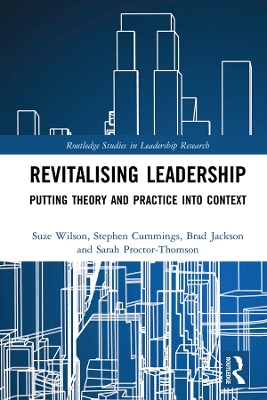Routledge Studies in Leadership Research
2 total works
Revitalising Leadership
by Suze Wilson, Stephen Cummings, Brad Jackson, and Sarah Proctor-Thomson
Revitalising leadership connects leadership theory and practice with context. It argues that the universal prescriptions favoured by most leadership scholars ignore the reality that context always matters in leadership practice – and so it should matter in leadership theorizing too. Addressing this gap, the book offers a novel framework that enables the development of context-sensitive leadership theory and practice. This framework directs theoretical and practical attention to the key challenges for leadership in different organizational contexts. It involves developing a specific purpose for leadership in a given context, as well as formulating the values, norms and domains of action which should guide leadership efforts in that context. Determining these various matters then informs the role, responsibilities, rights, behaviours and attributes relevant to leaders and followers for that context, and the focus, purpose and boundaries of the leader-follower relationship. Deploying this framework, six in-depth illustrative theorisations are provided, showing how leadership practice might best take shape in the contexts of supervisory management; HR management; innovation and entrepreneurship; strategy; governance; and leadership studies itself.
Revitalising leadership will appeal to diverse audiences, due to its theoretical novelty, its diversity of illustrative examples, its practice-focussed orientation and its clear, engaging style. These include leadership scholars concerned with the lack of attention being paid to context in leadership theorizing; organizational scholars wanting to learn how leadership thinking can be brought to bear on the different management functions the book explores; practitioners seeking leadership ideas that are tailored to the context they lead and follow in; and those involved in MBA or leadership development programmes who are looking to combine the personal reflection sought by such programmes with a thoughtful analysis of the context in which their leadership practice takes place.
Responsible Leadership in Corporate Governance
by Brad Jackson, Ljiljana Erakovic, Monique Cikaliuk, Chris Noonan, and Susan Watson
Responsibly led boards of directors make it possible for modern companies to survive and prosper under conditions of change. Despite the importance of boards of directors, their activities are often lionised or vilified by shareholders and stakeholders which obscures how boards enact responsible leadership. Responsible Leadership in Corporate Governance: An Integrative Approach introduces an integrative model of responsible leadership in governance that positions the board as a nexus of all corporate participants. In this model, responsibly led boards seek to make decisions in the best interests of the modern company as an entity that operates in a dynamic business environment.
This book provides a timely focus on in-depth cases of board led responsible leadership. Examining boards of directors in listed companies, state-owned enterprises, and private companies, the book connects insights from corporate governance and leadership to behaviours that affect boards’ relationships with shareholders and stakeholders. In addition, these insights underscore key requirements and challenges of responsible leadership in governance: from the importance of purpose and the crucial role of value creation to the difficulties of ownership transition and accountability. Far-sighted and experienced-based, this book will not only help students connect to real world situations but also will benefit those that interact with and support boards of directors.

